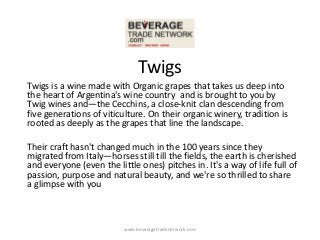
Twigs - Organic Wines looking for Wine Distributors and Wine Importers
- 1. Twigs Twigs is a wine made with Organic grapes that takes us deep into the heart of Argentina's wine country and is brought to you by Twig wines and—the Cecchins, a close-knit clan descending from five generations of viticulture. On their organic winery, tradition is rooted as deeply as the grapes that line the landscape. Their craft hasn't changed much in the 100 years since they migrated from Italy—horses still till the fields, the earth is cherished and everyone (even the little ones) pitches in. It's a way of life full of passion, purpose and natural beauty, and we're so thrilled to share a glimpse with you www.beveragetradenetwork.com
- 9. Bodega Familia Cecchin is a family owned company founded in 1959, nowadays headed by Alberto Cecchin from the third generation. Grapes have been always grown in a natural way without use of chemicals at all following the mind that nature gives all the tools to produce top quality wines. With personal care, the family works making handcraft made wines in a winery built on 1903 in the first estate the family acquired in the early 50´s. The company owns 3 estates or “fincas” with a total of 78 hectares, about 170 acres, all of the land fully certified as organic. www.beveragetradenetwork.com
- 10. The estate located in Maipu is the one where the company started and also the headquarter of the business as in this estate is the winery and tasting room for tourism, the offices, a restaurant named “A la sombra” ( in English “At the shade” www.grillalasombra.com.ar), the lodging and also the home where Alberto Cecchin and his 88 Uncle George live. This estate is old as from 1923 with the curiosity that vineyards are so close among them that have to be worked with a horse because they were planted in that way as at that time there were not tractors. In this estate non a chemical was used ever, so the soil is totally alive and pure. Organic Wine From the Vineyard Practices, at its most basic level, organic wine is made from grapes that have been grown without the use of chemical fertilizers, pesticides, fungicides and herbicides. www.beveragetradenetwork.com
- 11. At The Winery Winemaking techniques should be organic as well; little or no manipulation of wines by reverse osmosis, excessive filtration, or flavors additives (such as oak chips). Many organic winemakers like we do also only use wild yeasts for fermentation. When a label says “organic,” it means the wine has met certain standards that are set by a government agency. Different nations have their own certification criteria, so what’s organic in one country may not be so in another. The Certification as organic The wines Twigs are certified as organic by OIA Organizacion Internacional Agropecuaria, an entity who is accredited with the USDA to make the control and follow up of the production to be certified as organic. The organic practices in the vineyard, winery and bottling require a day to day record to let the trace of the full accomplishment of the organic standards. For the US the wines are certified under the NOP standards approved by the USDA. www.beveragetradenetwork.com
- 12. How does Conventional Viticulture differ from Organic Viticulture? I asked. -Conventional agricultural practices have stripped the minerals essential for healthy crops from the soil, needing the increasing use of artificial help to replace what has been lost. Currently insecticides, fumigants, and herbicides are being used in conventional wine grape production. - The key of organic farming is the soil. To keep a healthy, biologically active soil is the main objective for an organic farmer. In the vineyard it means cultivating the soil and planting cover crops, instead of applying herbicides. It means using natural fertilizers, such as composted animal manure, versus chemical fertilizers www.beveragetradenetwork.com
- 13. Organic growers use no synthetic growth-regulators. As for not using pesticides, the organic alternative is to encourage natural predators of insect pests instead of using poisonous insecticides. Organic farmers promote "biodiversity" and allow plants other than vines to grow in and around the vineyard. Biodiversity helps regulate the vineyard soil by attracting beneficial insects, spiders and predatory mites, as well as provide shelter and food (pollen, nectar and other bugs), and replaces the need for chemical pesticides or insecticides. What cannot be fully controlled through biodiversity can still be managed organically, through the use of naturally occurring plant or mineral extracts, which leave no residues in the soil. www.beveragetradenetwork.com
- 14. -To answer the problem of weeds, conventional farmers use chemical weed killers. The organic alternative is to allow the weeds to grow, and mow them periodically so that the cut weeds rot back into the ground, thus providing organic fertilizer. Twigs is looking for wine importers and wine distributors around the world. Please see full distribution offer on www.beveragetradenetwork.com or click on the image below www.beveragetradenetwork.com
